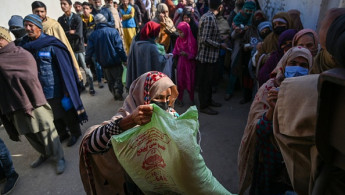UAE agrees to roll over crisis-stricken Pakistan's debt, add $1 billion more
The United Arab Emirates has agreed to roll over $2 billion owed by Pakistan and provide the country with an extra loan of $1 billion, Islamabad said Thursday.
The agreement comes as Pakistan grapples with a major foreign exchange crisis, holding enough reserves to pay for just three weeks of imports.
Pakistan Prime Minister Shehbaz Sharif arrived in the UAE earlier Thursday for talks with top Gulf officials to seek help for the battered economy.
We express our profound gratitude to H.H. President Sheikh @MohamedBinZayed for his decision to roll over $2 billion & provide additional $1 billion. This support will help us tide over economic difficulties. We are deeply touched by kind gesture of our Emirati brothers & sisters
— Shehbaz Sharif (@CMShehbaz) January 12, 2023
"The UAE president agreed to roll over the existing loan of US$2 billion and provide a US$1 billion additional loan," a statement from Sharif's office said.
"Both sides agreed to deepen the investment cooperation, stimulate partnerships and enable investment integration opportunities between the two countries."
The statement did not provide the terms of the loan agreement.
Pakistan's national debt stands at $274 billion - or nearly 90 percent of gross domestic product.
The nation's forex reserves have dwindled to less than $6 billion, with obligations of more than $8 billion due in the first quarter alone.
A $7 billion loan agreement with the IMF - about half of which has already been disbursed - has stalled because Pakistan has not fully implemented tough economic measures including slashing subsidies and raising taxes.
The economy has also been hammered by devastating monsoon floods that left almost a third of the country under water last year, and the government says it needs more than $16 billion over the next three years to rebuild.
Islamabad won some relief earlier this week when nations pledged over $9 billion to help with recovery efforts.
The UAE has sought to expand its influence inside and outside the Middle East region, including through Pakistan's Gwadar port.
The Gulf state has expanded its economic and military presence in ports across the Red Sea and South Asia region.





 Follow the Middle East's top stories in English at The New Arab on Google News
Follow the Middle East's top stories in English at The New Arab on Google News


